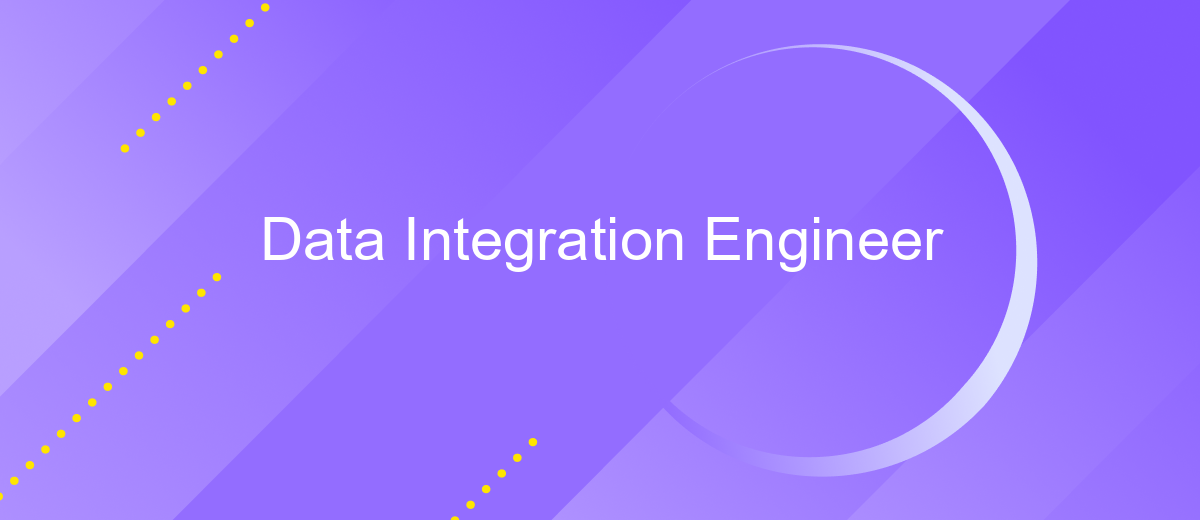Data Integration Engineer
A Data Integration Engineer plays a crucial role in modern organizations by seamlessly connecting diverse data sources, ensuring data consistency, and enabling informed decision-making. They design, implement, and manage data integration solutions, facilitating efficient data flow across systems. This article explores the key responsibilities, skills, and technologies essential for a successful career in data integration engineering.
Introduction
In today's data-driven world, the role of a Data Integration Engineer has become increasingly vital. These professionals are responsible for ensuring seamless data flow between disparate systems, enabling organizations to make informed decisions based on accurate and timely information. By leveraging various tools and technologies, Data Integration Engineers help businesses harness the full potential of their data assets.
- Designing and implementing data integration solutions
- Managing ETL (Extract, Transform, Load) processes
- Ensuring data quality and consistency
- Collaborating with data scientists and analysts
- Utilizing integration platforms like ApiX-Drive
ApiX-Drive is a powerful service that facilitates the automation of data integration tasks, making it easier for engineers to connect different applications and services. By using ApiX-Drive, Data Integration Engineers can streamline workflows, reduce manual effort, and ensure data accuracy across various systems. This ultimately leads to more efficient operations and better decision-making capabilities for organizations.
Key Responsibilities

As a Data Integration Engineer, you will be responsible for designing, implementing, and maintaining data integration solutions to ensure seamless data flow across various systems. You will work closely with stakeholders to understand their data requirements and develop integration strategies that align with business objectives. This includes creating data pipelines, automating data workflows, and ensuring data quality and consistency across platforms.
Additionally, you will leverage tools like ApiX-Drive to configure and manage integrations efficiently. Your role will involve troubleshooting and resolving data integration issues, optimizing performance, and ensuring data security and compliance. You will also be expected to document integration processes, provide technical support, and collaborate with cross-functional teams to enhance data integration capabilities continuously. Your expertise will be critical in enabling data-driven decision-making and improving overall operational efficiency.
Skills and Experience

A Data Integration Engineer must possess a strong foundation in data management and integration techniques. This role demands proficiency in various data integration tools and technologies, as well as the ability to design and implement seamless data workflows across multiple systems.
- Proficient in ETL tools such as Apache Nifi, Talend, and Informatica.
- Experience with data integration platforms like ApiX-Drive for automating and managing integrations.
- Strong knowledge of SQL, Python, and other scripting languages for data manipulation and transformation.
- Familiarity with cloud services such as AWS, Azure, and Google Cloud Platform.
- Understanding of data warehousing concepts and experience with databases like MySQL, PostgreSQL, and MongoDB.
- Excellent problem-solving skills and the ability to troubleshoot complex data issues.
- Strong communication skills to collaborate with cross-functional teams and stakeholders.
In addition to technical skills, a successful Data Integration Engineer should have a keen eye for detail and a proactive approach to identifying and resolving potential data discrepancies. Continuous learning and staying updated with the latest industry trends are essential to excel in this dynamic field.
Career Path

The career path of a Data Integration Engineer is both dynamic and rewarding, offering numerous opportunities for growth and specialization. Starting with a strong foundation in computer science or a related field, aspiring engineers often gain experience through internships or entry-level positions in IT or data management.
As they progress, Data Integration Engineers typically focus on mastering various tools and technologies for data integration. Knowledge of platforms like ApiX-Drive, which streamlines the process of connecting different applications and automating workflows, can be particularly advantageous. These skills are crucial as they enable engineers to efficiently handle complex data integration tasks.
- Entry-Level Data Integration Specialist
- Mid-Level Data Integration Engineer
- Senior Data Integration Engineer
- Data Integration Architect
- Data Integration Manager
Continued professional development is essential in this field. Pursuing certifications, attending workshops, and staying updated with the latest trends and technologies will help Data Integration Engineers advance their careers. Ultimately, the role offers a clear path to leadership positions, where one can influence strategic decisions and drive data integration initiatives within an organization.
Conclusion
In conclusion, the role of a Data Integration Engineer is pivotal in today's data-driven landscape. These professionals are responsible for ensuring seamless data flow across various systems, enabling organizations to make informed decisions based on comprehensive data insights. Their expertise in data mapping, ETL processes, and integration platforms is crucial for maintaining data integrity and optimizing data accessibility.
Moreover, leveraging tools like ApiX-Drive can significantly enhance the efficiency of data integration tasks. ApiX-Drive offers a robust platform that simplifies the process of connecting different applications and automating data workflows. By utilizing such services, Data Integration Engineers can focus on more strategic initiatives, ensuring that the organization's data ecosystem remains agile and responsive to evolving business needs. As the demand for real-time data integration continues to grow, the importance of skilled Data Integration Engineers will only increase, making their role indispensable in the modern enterprise.
FAQ
What is a Data Integration Engineer?
What skills are essential for a Data Integration Engineer?
How does a Data Integration Engineer ensure data quality?
What are some common challenges faced by Data Integration Engineers?
How can automation tools assist in data integration processes?
Routine tasks take a lot of time from employees? Do they burn out, do not have enough working day for the main duties and important things? Do you understand that the only way out of this situation in modern realities is automation? Try Apix-Drive for free and make sure that the online connector in 5 minutes of setting up integration will remove a significant part of the routine from your life and free up time for you and your employees.

